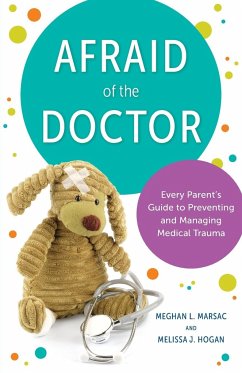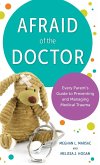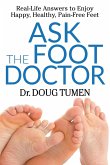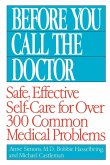Meghan L. Marsac, Melissa J. Hogan
Afraid of the Doctor
Every Parent's Guide to Preventing and Managing Medical Trauma
Meghan L. Marsac, Melissa J. Hogan
Afraid of the Doctor
Every Parent's Guide to Preventing and Managing Medical Trauma
- Broschiertes Buch
- Merkliste
- Auf die Merkliste
- Bewerten Bewerten
- Teilen
- Produkt teilen
- Produkterinnerung
- Produkterinnerung
Afraid of the Doctor is the first book written for parents with the primary goal of equipping them with the knowledge and skills to support their children through medical challenges on a day-to-day basis, and specifically with medical trauma-experiences in healthcare that can affect a child's response and willingness to even go to the doctor.
Andere Kunden interessierten sich auch für
![Afraid of the Doctor Afraid of the Doctor]() Meghan L. MarsacAfraid of the Doctor42,99 €
Meghan L. MarsacAfraid of the Doctor42,99 €![Chaly Goes to See The Doctor Chaly Goes to See The Doctor]() Chee VangChaly Goes to See The Doctor28,99 €
Chee VangChaly Goes to See The Doctor28,99 €![What Parents Are Afraid to Tell Their Daughters What Parents Are Afraid to Tell Their Daughters]() Kymberly Taylor-BrookinsWhat Parents Are Afraid to Tell Their Daughters13,99 €
Kymberly Taylor-BrookinsWhat Parents Are Afraid to Tell Their Daughters13,99 €![Sick of Being Sick Sick of Being Sick]() DPT FDN-P Brenda WaldingSick of Being Sick20,99 €
DPT FDN-P Brenda WaldingSick of Being Sick20,99 €![Ask the Foot Doctor Ask the Foot Doctor]() Doug TumenAsk the Foot Doctor18,99 €
Doug TumenAsk the Foot Doctor18,99 €![Before You Call the Doctor Before You Call the Doctor]() Bobbie HasselbringBefore You Call the Doctor31,99 €
Bobbie HasselbringBefore You Call the Doctor31,99 €![What Your Doctor Didn't Tell You About Childhood Constipation What Your Doctor Didn't Tell You About Childhood Constipation]() Wendy HaydenWhat Your Doctor Didn't Tell You About Childhood Constipation23,99 €
Wendy HaydenWhat Your Doctor Didn't Tell You About Childhood Constipation23,99 €-
-
-
Afraid of the Doctor is the first book written for parents with the primary goal of equipping them with the knowledge and skills to support their children through medical challenges on a day-to-day basis, and specifically with medical trauma-experiences in healthcare that can affect a child's response and willingness to even go to the doctor.
Hinweis: Dieser Artikel kann nur an eine deutsche Lieferadresse ausgeliefert werden.
Hinweis: Dieser Artikel kann nur an eine deutsche Lieferadresse ausgeliefert werden.
Produktdetails
- Produktdetails
- Verlag: Rowman & Littlefield Publishers
- Seitenzahl: 262
- Erscheinungstermin: 2. Juli 2024
- Englisch
- Abmessung: 216mm x 140mm x 16mm
- Gewicht: 374g
- ISBN-13: 9781538198988
- ISBN-10: 1538198983
- Artikelnr.: 70437399
- Herstellerkennzeichnung
- Libri GmbH
- Europaallee 1
- 36244 Bad Hersfeld
- gpsr@libri.de
- Verlag: Rowman & Littlefield Publishers
- Seitenzahl: 262
- Erscheinungstermin: 2. Juli 2024
- Englisch
- Abmessung: 216mm x 140mm x 16mm
- Gewicht: 374g
- ISBN-13: 9781538198988
- ISBN-10: 1538198983
- Artikelnr.: 70437399
- Herstellerkennzeichnung
- Libri GmbH
- Europaallee 1
- 36244 Bad Hersfeld
- gpsr@libri.de
By Meghan L. Marsac and Melissa J. Hogan - Foreword by John F. Crowley
Acknowledgements
How to Use This Book
Preface
PART 1 THE REALITY OF MEDICAL TRAUMA
Chapter 1: Where Love Meets Medicine
Chapter 2: Parenting Through Medical Challenges
Chapter 3: The Medical Journey
PART 2 MEDICAL TRAUMA 101
Chapter 4: What Exactly Is Medical Trauma?
Chapter 5: How Do I Know if My Child has Medical Trauma?
Chapter 6: What Isn't Medical Trauma?
Chapter 7: Medical Sprints Versus Medical Marathons
Chapter 8: Your Family and the Health Care System
PART 3 WHO ARE YOU?
Chapter 9: You Are a Person, Then a Parent
Chapter 10: You Are a Caregiver
Chapter 11: You Are the Leader of Your Child's Medical Team
Chapter 12: You Are a C.O.A.C.H.
PART 4 STRATEGIES FOR PREVENTING AND REDUCING MEDICAL TRAUMA
Chapter 13: General Strategies: Parenting Children with Medical Conditions
Chapter 14: Planning Ahead: "Planning Makes... Better"
Chapter 15: Communication: "Let's Talk About It"
Chapter 16: Consistency: "Knowing What to Expect"
Chapter 17: Behavior Charts: "Not Bribing, Rewarding"
Chapter 18: Additional Visual Supports: "Creative Preparation"
Chapter 19: Desensitization: "Let's Get Used to It"
Chapter 20: Medical Play: "Children Learn Through Play"
Chapter 21: Adapting the Environment: "Make Yourself at Home"
Chapter 22: Timing: "6 am or 6 pm?"
Chapter 23: Distraction: "Squirrel!"
Chapter 24: Reinforcement: "Walk the Line"
Chapter 25: Body Control: "Mind-Body Connection"
Chapter 26: Switching Strategies: "If at First You Don't Succeed, Try
Again"
PART 5 SPECIAL POPULATIONS
Chapter 27: Children with Cognitive Impairment
Chapter 28: Children Who Are Nonverbal or Who Have Communication Needs
Chapter 29: Very Young Children
PART 6 CAN PARENTS DEVELOP MEDICAL TRAUMA TOO?
Chapter 30: Medical Trauma in Parents
Chapter 31: What's "Wrong" With Me?
Chapter 32: How Can I Support Myself?
PART 7 WRAPPING UP
Chapter 33: Seeking More Help
Chapter 34: Epilogue
Additional Resources
Bibliography
Notes
Index
About the Authors
How to Use This Book
Preface
PART 1 THE REALITY OF MEDICAL TRAUMA
Chapter 1: Where Love Meets Medicine
Chapter 2: Parenting Through Medical Challenges
Chapter 3: The Medical Journey
PART 2 MEDICAL TRAUMA 101
Chapter 4: What Exactly Is Medical Trauma?
Chapter 5: How Do I Know if My Child has Medical Trauma?
Chapter 6: What Isn't Medical Trauma?
Chapter 7: Medical Sprints Versus Medical Marathons
Chapter 8: Your Family and the Health Care System
PART 3 WHO ARE YOU?
Chapter 9: You Are a Person, Then a Parent
Chapter 10: You Are a Caregiver
Chapter 11: You Are the Leader of Your Child's Medical Team
Chapter 12: You Are a C.O.A.C.H.
PART 4 STRATEGIES FOR PREVENTING AND REDUCING MEDICAL TRAUMA
Chapter 13: General Strategies: Parenting Children with Medical Conditions
Chapter 14: Planning Ahead: "Planning Makes... Better"
Chapter 15: Communication: "Let's Talk About It"
Chapter 16: Consistency: "Knowing What to Expect"
Chapter 17: Behavior Charts: "Not Bribing, Rewarding"
Chapter 18: Additional Visual Supports: "Creative Preparation"
Chapter 19: Desensitization: "Let's Get Used to It"
Chapter 20: Medical Play: "Children Learn Through Play"
Chapter 21: Adapting the Environment: "Make Yourself at Home"
Chapter 22: Timing: "6 am or 6 pm?"
Chapter 23: Distraction: "Squirrel!"
Chapter 24: Reinforcement: "Walk the Line"
Chapter 25: Body Control: "Mind-Body Connection"
Chapter 26: Switching Strategies: "If at First You Don't Succeed, Try
Again"
PART 5 SPECIAL POPULATIONS
Chapter 27: Children with Cognitive Impairment
Chapter 28: Children Who Are Nonverbal or Who Have Communication Needs
Chapter 29: Very Young Children
PART 6 CAN PARENTS DEVELOP MEDICAL TRAUMA TOO?
Chapter 30: Medical Trauma in Parents
Chapter 31: What's "Wrong" With Me?
Chapter 32: How Can I Support Myself?
PART 7 WRAPPING UP
Chapter 33: Seeking More Help
Chapter 34: Epilogue
Additional Resources
Bibliography
Notes
Index
About the Authors
Acknowledgements
How to Use This Book
Preface
PART 1 THE REALITY OF MEDICAL TRAUMA
Chapter 1: Where Love Meets Medicine
Chapter 2: Parenting Through Medical Challenges
Chapter 3: The Medical Journey
PART 2 MEDICAL TRAUMA 101
Chapter 4: What Exactly Is Medical Trauma?
Chapter 5: How Do I Know if My Child has Medical Trauma?
Chapter 6: What Isn't Medical Trauma?
Chapter 7: Medical Sprints Versus Medical Marathons
Chapter 8: Your Family and the Health Care System
PART 3 WHO ARE YOU?
Chapter 9: You Are a Person, Then a Parent
Chapter 10: You Are a Caregiver
Chapter 11: You Are the Leader of Your Child's Medical Team
Chapter 12: You Are a C.O.A.C.H.
PART 4 STRATEGIES FOR PREVENTING AND REDUCING MEDICAL TRAUMA
Chapter 13: General Strategies: Parenting Children with Medical Conditions
Chapter 14: Planning Ahead: "Planning Makes... Better"
Chapter 15: Communication: "Let's Talk About It"
Chapter 16: Consistency: "Knowing What to Expect"
Chapter 17: Behavior Charts: "Not Bribing, Rewarding"
Chapter 18: Additional Visual Supports: "Creative Preparation"
Chapter 19: Desensitization: "Let's Get Used to It"
Chapter 20: Medical Play: "Children Learn Through Play"
Chapter 21: Adapting the Environment: "Make Yourself at Home"
Chapter 22: Timing: "6 am or 6 pm?"
Chapter 23: Distraction: "Squirrel!"
Chapter 24: Reinforcement: "Walk the Line"
Chapter 25: Body Control: "Mind-Body Connection"
Chapter 26: Switching Strategies: "If at First You Don't Succeed, Try
Again"
PART 5 SPECIAL POPULATIONS
Chapter 27: Children with Cognitive Impairment
Chapter 28: Children Who Are Nonverbal or Who Have Communication Needs
Chapter 29: Very Young Children
PART 6 CAN PARENTS DEVELOP MEDICAL TRAUMA TOO?
Chapter 30: Medical Trauma in Parents
Chapter 31: What's "Wrong" With Me?
Chapter 32: How Can I Support Myself?
PART 7 WRAPPING UP
Chapter 33: Seeking More Help
Chapter 34: Epilogue
Additional Resources
Bibliography
Notes
Index
About the Authors
How to Use This Book
Preface
PART 1 THE REALITY OF MEDICAL TRAUMA
Chapter 1: Where Love Meets Medicine
Chapter 2: Parenting Through Medical Challenges
Chapter 3: The Medical Journey
PART 2 MEDICAL TRAUMA 101
Chapter 4: What Exactly Is Medical Trauma?
Chapter 5: How Do I Know if My Child has Medical Trauma?
Chapter 6: What Isn't Medical Trauma?
Chapter 7: Medical Sprints Versus Medical Marathons
Chapter 8: Your Family and the Health Care System
PART 3 WHO ARE YOU?
Chapter 9: You Are a Person, Then a Parent
Chapter 10: You Are a Caregiver
Chapter 11: You Are the Leader of Your Child's Medical Team
Chapter 12: You Are a C.O.A.C.H.
PART 4 STRATEGIES FOR PREVENTING AND REDUCING MEDICAL TRAUMA
Chapter 13: General Strategies: Parenting Children with Medical Conditions
Chapter 14: Planning Ahead: "Planning Makes... Better"
Chapter 15: Communication: "Let's Talk About It"
Chapter 16: Consistency: "Knowing What to Expect"
Chapter 17: Behavior Charts: "Not Bribing, Rewarding"
Chapter 18: Additional Visual Supports: "Creative Preparation"
Chapter 19: Desensitization: "Let's Get Used to It"
Chapter 20: Medical Play: "Children Learn Through Play"
Chapter 21: Adapting the Environment: "Make Yourself at Home"
Chapter 22: Timing: "6 am or 6 pm?"
Chapter 23: Distraction: "Squirrel!"
Chapter 24: Reinforcement: "Walk the Line"
Chapter 25: Body Control: "Mind-Body Connection"
Chapter 26: Switching Strategies: "If at First You Don't Succeed, Try
Again"
PART 5 SPECIAL POPULATIONS
Chapter 27: Children with Cognitive Impairment
Chapter 28: Children Who Are Nonverbal or Who Have Communication Needs
Chapter 29: Very Young Children
PART 6 CAN PARENTS DEVELOP MEDICAL TRAUMA TOO?
Chapter 30: Medical Trauma in Parents
Chapter 31: What's "Wrong" With Me?
Chapter 32: How Can I Support Myself?
PART 7 WRAPPING UP
Chapter 33: Seeking More Help
Chapter 34: Epilogue
Additional Resources
Bibliography
Notes
Index
About the Authors








